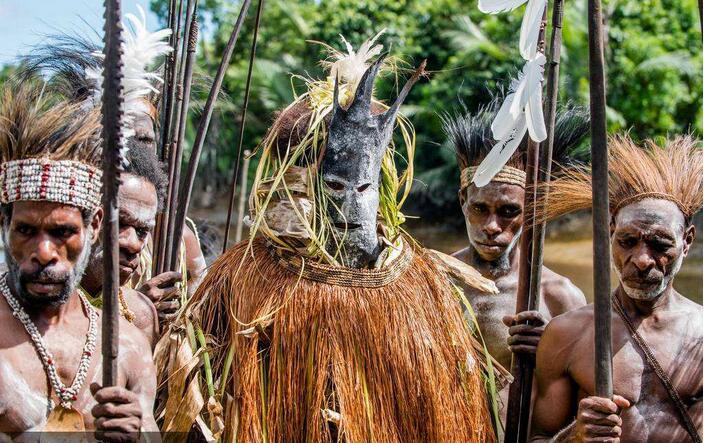亚洲
Sorcery in Papua New Guinea: When the hurlyburly's done
巴布亚新几内亚的巫术:当喧嚣归于沉寂
The gruesome consequences of accusations of “witches” craft.
被指控“女巫”后的恐怖命运。
It Began, as it usually does, with an unexpected death: in this case, of Jenny's husband, an esteemed village leader in the province of Eastern Highlands, in Papua New Guinea (PNG).
正如以往,一次意外死亡是这场悲剧的开始:死者是珍妮的丈夫,他是巴布亚新几内亚东部高地省一位受人尊敬的村长。
Some local boys accused Jenny of having cast a spell to kill him.
当地一些男孩指控珍妮对她的丈夫施了魔法,置他于死地。

She says they began beating her over the head with large branches.
珍妮说,这些男孩用粗树枝抽打她的头部。
Her family supported her accusers.
而这些指控者得到了她家人的支持。
She fled into the surrounding fields, eventually making her way to the provincial capital of Goroka, where she has lived for the past three years.
珍妮逃进周围的田野里,最后在省会城市戈罗卡呆了三年。
“I can never go back to my village,” she says, “and I never want to see my family again.”
“我再也不回村子去了,”她说,“我也再不想见到家人。”
Jenny was lucky: she escaped.
珍妮很幸运:她幸免于难死。
Every year, hundreds of suspected witches and sorcerers are killed in PNG.
每一年,巴布亚新几内亚有上百上千的人因被怀疑是女巫或者巫师而被杀。
Accusers often enlist the aid of a “glass man” (or “glass Mary” ) : a diviner whom they pay to confirm their accusations.
这些人被“带上女巫、男巫的帽子”:他们付钱给这些占卜者来证明实自己的指控。
Most of the victims are poor, vulnerable women including widows like Jenny.
受害者绝大多数是像珍妮这样孤苦无依的女人。
“If you have a lot of strong sons,” says Charlotte Kakebeeke of Oxfam, a charity, “you won't be accused.”
慈善机构Oxfam的Charlotte Kakebeeke说,“如果你有一大群壮实的儿子,没人敢来指控你。”
When the accused try to take shelter with relatives, their families often reject them: the supposed witches' husbands have paid their families a “bride price” which would have to be returned if the bride left the husband's family.
当被指控为巫师的人者尝试投靠亲戚向亲人求助时,经常会被拒绝:所谓的女巫的丈夫们已经给了女方她们家里一笔贿赂金“嫁妆”,如果女方新娘离开夫家,这笔嫁妆就得还回去。


